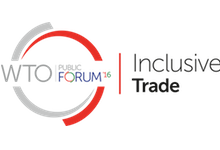Electronic commerce and participation of SMEs in world trade
28 Sep 2016 09:00h - 10:30h
Event report
[Read more session reports and live updates from the 2016 WTO Public Forum.]
This session, organised by the China Institute for WTO Studies, University of International Business and Economics, and IDEAS Centre Geneva, focused on increasing the participation of small and medium enterprises (SMEs) in international trade. It also discussed policy and the practical challenges facing e-commerce.
Daniel Crosby, Partner at King & Spalding, noted that e-commerce is very powerful in China and will also benefit many countries. He mentioned that there are both practical and policy challenges in international trade rules such as competitive prices in the market and protection from competition. As e-commerce is taking place globally, there is an issue of how countries should regulate e-commerce in a way that meets the national interest. Crosby suggested that looking at the existing systems and thinking about how these systems can facilitate the participation of countries may help to build a regulatory framework. The challenges regarding access to technology, distribution channels, and multilateral trading systems should be taken into account in the process of building regulations.
Xinquan Tu, Dean and Professor at China Institute for WTO Studies, University of International Business and Economics, introduced two business models regarding international e-commerce that bridge the gap between suppliers and consumers. The first model – One Touch Business Services Co., Ltd, a trading foreign service company – was able to help SMEs to reduce the cost of trade by collecting orders and cooperating with banks for financial trade. Another model – SJET Supply Chain Co., Ltd, a supply chain company in China – mainly works together with mobile industries and helps SMEs to connect with international trade. Tu noted that e-commerce can significantly reduce the costs incurred by SMEs in their activities, and also build strong relationships between suppliers and consumers.
Marcos Vaena, Chief of Enterprise Competitiveness at the International Trade Centre, addressed those building blocks that are fundamental for SMEs in e-commerce. Vaena talked about the role of trade policies in facilitating payment systems and cross-border trade.
Torbjörn Fredriksson, Chief of ICT Analysis Section of the Division on Technology and Logistics at the UN Conference on Trade and Development (UNCTAD), believes that e-commerce is growing fast at the global level and will create both opportunities and challenges for winners and losers in the market. E-commerce will also create job opportunities; however, with the benefits come disadvantages, such as fraud, a negative impact on trade balance, tax revenues, and a widening divide as some SMEs cannot participate in digital trade.
Xiankun Lu, Partner at IDEAS Centre, Geneva, pointed out that least developed countries (LDCs) and small countries should be brought together into a multilateral system where inclusivity is the key to the involvement of countries in overcoming barriers in the digital divide.
The Q&A session discussed how to make e-commerce inclusive and whether the same policies and regulations should be applied for both business to business (B2B) and business to consumer (B2C). The panellists concluded the session by addressing where the WTO can make the biggest contribution in regulations and policies related to e-commerce, such as consumer protection, privacy, cybercrime, payment systems, and so on.
by Aye Mya Nyein
Related topics
Related event

